Reviews
Don Siegel
USA, 1971
Credits
Review by Thomas Scalzo
Posted on 13 July 2009
Source Warner Brothers DVD
Categories Favorites: The Action Movie
I know what you’re thinking: ‘Did he fire six shots or only five?’ Well, to tell you the truth, in all this excitement I kind of lost track myself. But being as this is a .44 Magnum, the most powerful handgun in the world, and would blow your head clean off, you’ve got to ask yourself one question: ‘Do I feel lucky?’ Well, do ya, punk?
We know the quote, not to mention the iconic image of Clint Eastwood staring down the barrel of his .44 Magnum looking like he hasn’t had a satisfying bowel movement in decades. And when a film has been lampooned by The Naked Gun 1, it’s hard to debate it’s spot among the elite of American popular culture iconography. Such popularity, however, can often lead to the subtler elements of a film being overlooked. After all, when a movie has so long been bathed in the adoring light of film fan admiration, the finer details of story and character sometimes slip into shadow.
For instance, until I re-watched the film for this review, it had slipped my mind that “Go ahead, make my day,” is never uttered in Dirty Harry. (Callahan bites off the words in Sudden Impact.) And in re-experiencing the various explanations offered as to why Harry Callahan is “dirty” - he has a foul mouth, he does all the dirty jobs, he always gets the shit end of the stick - I was reminded that the man himself is much more than just a catchphrase and a gun. But just who is he? A racist? A peeping tom? A lackey? A hero? With these questions in mind, I sat down for a screening of Dirty Harry, determined to better understand the man behind the Magnum.
The story begins high above the streets of San Francisco, a rifle-toting killer peering down at his prospective victim as she swims a few laps in a rooftop pool. Soon enough, the shot rings out, the girl is dead, and Detective Harry Callahan is on the scene. Some nifty detective work nets Harry an extortion note from Scorpio the killer: $100,000 by tomorrow, or else. Not only does the efficient scene introduce our hero and kick-start the plot, it also offers us our first glimpse of Bruce Surtees’ breathtaking aerial cinematography, and treats us to the first notes of Lalo Schiffrin’s intoxicating jazz fusion-funk score.
As the story progresses, the consistent excellence of these two elements - photography and music - create an engaging world of tangible coolness that helps disguise the fact that the actual plot isn’t very compelling. For starters, we know the killer’s identity and motivations early on, which removes any sense of mystery from the proceedings. And without any questions as to the who or the why of the situation, we have a good sense of how the game will play out—psycho demands money, cops pretend to play along, cops don’t play along, psycho kills again and demands more money. What this average narrative does accomplish, however, is to serve as a vehicle for fleshing out the fascinating figure that is Harry Callahan.
Having recently analyzed Peter Yates’ Bullitt, also a loose-cannon cop story (and also scored by Schiffrin), comparisons between McQueen’s Bullitt and Eastwood’s Callahan were inevitable. Like Bullitt, Callahan is an authority-defying San Francisco detective tasked with a difficult and dangerous case. Also like Bullitt, Callahan faces a formidable swath of red tape standing between him and successful completion of the job. David Thomson, that inimitable author of A Biographical Dictionary of Film, has even gone so far as to call Bullitt “a pioneer for Dirty Harry.”
Unfortunately, following the loner cop trail that Bullitt blazed has lead Harry Callahan, not merely to a place of professional frustration, but to a land of outright impotence. Unlike Bullitt, whose daily tasks regularly find him in the role of the aggressor - actively chasing the bad guys through the streets of San Francisco, for instance - Callahan’s action set pieces often find him simply reacting to events beyond his control. Most notable among these is the gripping ransom sequence in which Harry plays bagman to the killer’s cash-for-captive-girl demands. Hoping to evade a possible police trap, Scorpio demands that Harry follow a circuitous route to the drop site, revealing each subsequent step of the journey by phone. Throughout the course of an endless night, Harry crisscrosses the city, running from phone booth to phone booth to obtain his orders, completely at the mercy of a madman’s whims.
Even when Harry becomes so fed up by being led around by the nose that he does take the aggressive tack - trailing the killer to his home and forcibly obtaining the location of the missing girl - he’s summarily cut off at the knees by his superiors, who claim his methods were inappropriate and the evidence he obtained inadmissible. Despite Harry’s efforts, Scorpio will be set free. Eastwood’s incredulous and exasperated expression at hearing this news perfectly encapsulates Harry’s impotence. How can a man be expected to endure in a world where criminals are coddled and lawmen are rebuked for doing their jobs? As these scenes demonstrate, Harry is a man assailed by the fates at every turn, seemingly incapable of directing the course of his own life.
Such powerlessness over one’s existence inevitably leads to mounting frustration, and the desperate need for release. Stymied professionally, Harry’s thoughts inevitably turn to sex. Unfortunately, as a man who lost his wife some time ago, and has no intimate relationship that we know of, Harry seems doomed to frustration in this realm, too. In fact, Harry seems almost incapable of relating to women as a mature adult.
Take his encounter with Hot Mary and her boyfriend. After trailing a suspect down a dark alley, Harry watches his quarry enter an apartment building. Peering in at the man from a window outside, Harry quickly determines that he’s got the wrong guy. But instead of walking away, he stays, watching, and then leering, as the man disrobes his pulchritudinous girlfriend. And then there’s the rooftop stakeout. Training his binoculars on a nearby apartment building, he happens upon a lovely naked woman prancing about behind a curtainless window. Catching himself leering again, he turns away. But then he mutters, “You owe it to yourself to live a little, Harry,” and returns his gaze to the girl. At that very moment, however, Scorpio strikes and Harry must leap into action. Incredibly, the pleasures of even this voyeuristic outlet are denied him.
To a man thus frustrated, the only apparent avenue of release that remains is violence. And for Harry Callahan, violence means firing a gun. Take the bank robbery scene. Calmly enjoying a lunch of hotdogs, Harry hears some commotion behind him. After leaping out of his seat and running into the street, Harry unsheathes his weapon and fires, killing a few of the men and critically wounding another. Harry then walks directly up to the wounded man, points the legendary Magnum in his face, and spouts his famous line about the prowess of his sidearm. Compare this quick-draw demeanor - and obvious revelry in the chance to fire his gun - with Bullitt’s impeccable restraint, drawing his weapon only once, and then only when he has no other choice. Not to belabor the pistol-penis connection, but could Harry’s quick draws serve as a poor substitute for the bedroom scenes he never gets to experience? While certainly not a central element of Bullitt, McQueen’s character’s occasional dalliances with his lady friend confirm that he’s capable of satisfying that basic human need. This affords Bullitt a sense of life balance that Callahan sorely lacks. Perhaps if he found himself a girl, Harry’s regular resort to violence might not come so quickly.
In any event, as the film reaches its climax, the onslaught of personal and professional aggravations have reached a fever pitch, and Harry is about to snap. After leaping onto a moving school bus, and chasing Scorpio through an old mill, Harry finally corners his quarry on the bank of a pond. Motivations related to fulfilling his duties as a police officer have taken a backseat to Harry’s own need for a decisive, cathartic act. As if to cleanse himself of the impotent man he was, he repeats his famous line. But this time, there is one last bullet in the chamber, and Harry knows it. After staring down at Scorpio floating lifeless in the water, Harry removes his badge and tosses it into pond. It is an act of defiance, yes, but more than that, it is Harry recognizing his own hypocrisy. For he knows that he’s killed for himself, not for justice. In short, the act was dirty, the act of a man determined to create his own definition of himself.
- Dirty Harry, Harry Callahan:
When an adult male is chasing a female with intent to commit rape, I shoot the bastard. That’s my policy.
The Naked Gun, Frank Drebin:
When I see five weirdos, dressed in togas, stabbing a man in the middle of the park in full view of a hundred people, I shoot the bastards, that’s my policy. ↩
More Favorites: The Action Movie
-

First Blood
1982 -
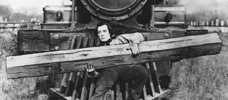
The General
1926 -

The Running Man
1987 -

Guns
1990 -
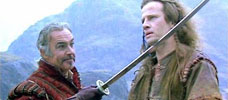
Highlander
1986 -
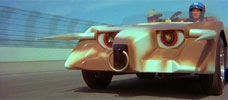
Death Race 2000
1975 -
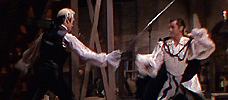
Scaramouche
1952 -

Do or Die
1991 -
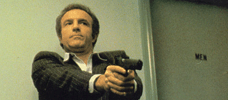
Thief
1981 -

Mission: Impossible
1996 -
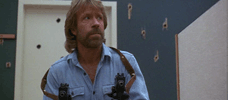
Invasion U.S.A.
1985 -

Rambo: First Blood Part II
1985 -

Bullitt
1968 -

Hard Hunted
1992 -

The Fugitive
1993 -

Kindergarten Cop
1990 -
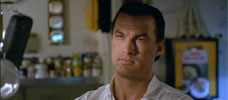
Under Siege
1992 -
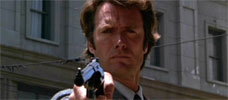
Dirty Harry
1971 -
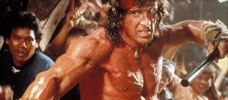
Rambo III
1988 -
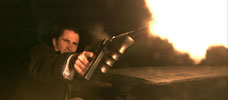
Public Enemies
2009 -

Day of the Warrior
1996 -

The Good, the Bad, the Weird
2008 -
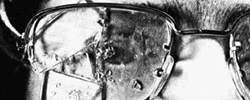
Straw Dogs
1971 -
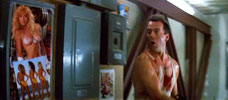
Die Hard
1988 -
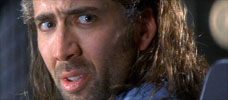
Con Air
1997 -

Collateral Damage
2002 -
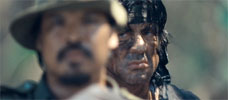
Rambo
2008
We don’t do comments anymore, but you may contact us here or find us on Twitter or Facebook.



